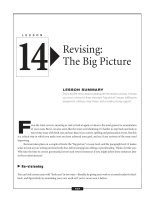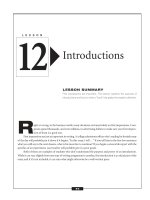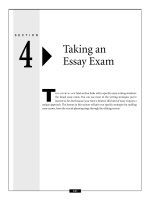Write Better Essays - Thinking about Audience and Purpose
Bạn đang xem bản rút gọn của tài liệu. Xem và tải ngay bản đầy đủ của tài liệu tại đây (119.17 KB, 12 trang )
I
magine you’ve just had an amazing experience: You were able to save someone’s life by performing CPR.
You want to share the experience with three people: your father, your best friend, and the admissions offi-
cer at your first-choice college. How will you describe what happened? Will that description be the same
for each person? Probably not. Although the subject remains a constant, each person is a different audience, requir-
ing different word choices, levels of formality, and tone.
Because you are sharing the experience with these three people for different reasons, the purpose of your
description changes, too. You might tell your father to let him know that his advice about taking a CPR course
was invaluable. To your friend, you might stress the emotions the experience evoked. In your college application
essay, you place an emphasis on the experience’s revelation of your competent and responsible nature.
Audience and purpose not only determine how you write; they shape your content, or what you write as well.
Therefore, the first step to writing better essays is to understand who you are writing for and why you are writing.
LESSON
Thinking about
Audience and
Purpose
LESSON SUMMARY
The first step toward effective essay writing is to know why and for
whom you’re writing. This lesson explains how to understand your
audience and purpose and how these two factors affect your writing.
1
19
Understanding Your Audience
Imagine that you’ve been asked to write about your life-saving experience for the local hospital newsletter. You
expect your audience to be adults, so you plan and draft your article in anticipation of that audience. But when
you submit it, you find that the hospital plans to use your article in a supplement for elementary school students.
Can they print it as written? Not if they want their readers to understand what you’ve written.
Understanding your audience is a critical component of effective writing. Before you begin any type of essay,
you must find out:
1. Who will read your essay and why are they reading it?
2. What do they know about your subject?
3. What is your relationship with the reader?
Pinpointing Your Audience
If you’re writing for a teacher, you know his or her name and face, as well as the expectations he or she has for your
writing. But determining your audience doesn’t always mean knowing exactly who will be reading, grading, or
scoring your essay. In fact, often you’ll need to write for someone, or a number of people, you’ll never meet. For
example, if you are taking the ACT or SAT, you know that two people will read your essay and score it. You also
know the criteria for each score. You don’t know the readers’ names, or where they’re from, but you know
enough about what they’re looking for to understand how to write to them. Knowing your audience in this case
means knowing what they’re looking for.
In other words, your readers will pick up your writing in order to give it a grade or score. You need to know
their expectations in order to fulfill them. What does your English teacher consider an A essay? How does a col-
lege admissions officer judge an essay? For the SAT and ACT, what does the scoring rubric look like? What are the
differences between an essay that gets a 6, and one that gets a 2? Here are some general guidelines:
WHO THEY ARE WHAT THEY’RE LOOKING FOR
Admissions officer an engaging essay that reveals your personality, goals, and values; evidence that
you can organize your thoughts and communicate effectively
SAT and ACT scorers a polished rough draft that responds to the topic, develops a point of view, and sup-
ports that point of view with examples and evidence
AP Exam evaluators a clear and cohesive essay that demonstrates mastery of the subject matter
High school teachers a combination of the following: mastery of the material (do you understand the
book, concept, issue?); a clear and original thesis; mastery of the essay form (clear
thesis, strong support, logical organization); mastery of standard written English
Here’s an example. Imagine that you have been asked to write about a poem. Clearly, you could not write
the same essay for a college application and an English Literature AP exam. You have two different sets of actual
readers who want two very different things from you.
–THINKING ABOUT AUDIENCE AND PURPOSE–
20
Admissions officers, for example, would prefer a very personal response to the poem, one that reveals
something about who you are and what is important to you. They might want to know if the poem helps you bet-
ter understand something about yourself and your values. They might want to know how you understand the poem.
What does it mean to you? How does it make you feel? What do you get out of it? How can you relate it to your life?
The Audience’s Relationship to the Subject
In addition, it’s essential to consider the relationship of your audience to your subject. What are they likely to know
about your topic? How interested will they be in what you have to say? How likely are they to agree or disagree
with your ideas?
What Your Readers Know about the Subject
One of the biggest mistakes writers make is to assume that their readers know what they’re talking about. Just
because you know your subject intimately doesn’t mean your readers do. You need to carefully consider how much
your readers may know about your subject. For example, you’ve decided to write about your interest in robotics
for your college application essay. If you use terms like “range weighted Hough Transform” and “sensor fusion algo-
rithm,” chances are your readers won’t know what you’re talking about. You’ll either have to explain your terms
or replace the technical jargon with words the average reader can understand.
Similarly, say you decide to write about your favorite novel. Should you assume your readers have read the
novel? If they have, should you assume that they read it recently enough to remember its characters, plot, and
themes? Unless you know for sure, or unless your assignment specifically mentions an assumption (“assume your
readers have read The Great Gatsby carefully”), you must provide sufficient background information for your read-
ers. You’ll need to briefly summarize the plot and provide context for the specific scenes and issues you’d like to
discuss.
How Your Readers Feel about the Subject
Another important consideration is how your readers might feel about the subject. Will they be interested in it?
If not, what can you do to arouse their interest? If you’ve taken a position on an issue, how likely is it that your
readers will share your opinion? If they’re likely to disagree, how can you help them accept, or at least understand,
your position? (You’ll learn more about this issue in Lesson 11.)
Your Relationship to the Reader
Finally, there’s one more question to ask about your audience: What is your relationship to him or her? This rela-
tionship helps determine the style, tone, and format of your essay.
Though the writing situations discussed in this book are different, your relationship to the actual reader is
quite similar in each case: that of evaluatee to evaluator. The primary reason your actual readers—college admis-
sion officers, SAT and ACT scorers, AP essay exam readers, and teachers—are reading your essay is not for their
reading pleasure. Instead, they are reading to evaluate.
How does this relationship affect your writing? For most situations, it is in your best interest to be formal
(but not stuffy), respectful (but not overly gracious), and courteous (but not ceremonious). You must also fol-
low the provided guidelines or expectations. For example, if your instructor wants your essay typed in a 12-point
font, double-spaced, with one-inch margins, and one staple in the top left-hand corner, that’s exactly what you
should hand in.
–THINKING ABOUT AUDIENCE AND PURPOSE–
21
Practice 1
1. Briefly explain how to write for an audience that will remain unknown to you personally.
2. A Martian has just landed in your backyard. He asks where he’s landed. You answer, “America.” “What kind of
place is America?” he replies.
a. Who is your audience for this writing assignment?
b. Given your audience, how should you approach your topic, and why?
Knowing Your Purpose
Whether you’re writing a college application essay or an essay for your political science class, one of your goals is
to receive a positive evaluation for your essay. But for that to happen, the essay itself must have a clear purpose.
As important as knowing whom you’re writing for is knowing why you’re writing. What is the goal of your
essay? What are you hoping to convey through your writing? If your essay effectively achieves its purpose, you’re
more likely to achieve your goal of a high grade or score.
To help you clarify your purpose, you can try a simple fill-in-the-blank:
My goal in this essay is to .
Try to find a verb, or verbs, that best describe what you want your essay to do. For example:
My goal in the essay is to: demonstrate that I am a resourceful person.
explain why I took a year off after high school and show how that year prepared me
for college.
prove that Victor Frankenstein, rather than his creature, is the monster.
–THINKING ABOUT AUDIENCE AND PURPOSE–
22
Here are some other verbs that can help define purpose:
compare describe propose
contrast encourage review
convince explore show
defend inform summarize
Notice how the verb specifies purpose in the following example:
Herman Melville wrote, “He who never made a mistake never made a discovery.” In an essay, describe how a mistake
you made led to an important discovery.
My goal is to show how my mistake taught me an important lesson: If you don’t follow directions, someone can
get hurt.
By clarifying your audience and purpose, you can help ensure that your essay does what it’s supposed to, and
that its content, structure, and style will be right for its audience. Knowing what you want to say, to whom, and
why, should always be the first step in the writing process.
Practice 2
For this assignment, how would you describe your purpose?
Read Langston Hughes’s essay “Salvation.” In an essay, discuss the central conflict that Hughes describes. How does
Hughes resolve that conflict?
In Short
Effective writing begins with a clear understanding of audience and purpose. Know your audience: who will read
your essay, why they will read it, and what they already know about your subject. Consider your relationship to
your readers, and be sure to carefully consider your purpose. Why are you writing? What do you hope to achieve
in your essay?
–THINKING ABOUT AUDIENCE AND PURPOSE–
23









